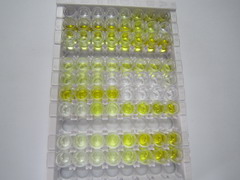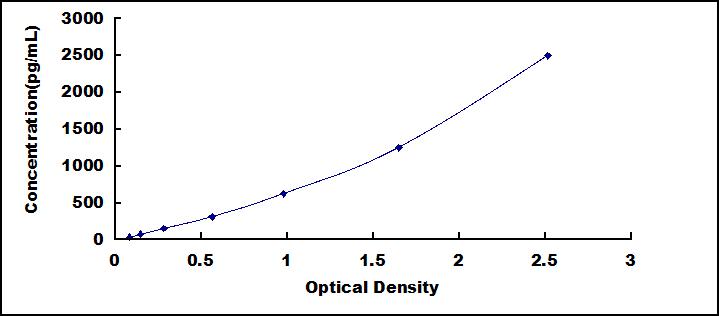Packages (Simulation)

Reagent Preparation

Image (I)
Image (II)
Certificate


ELISA Kit for Factor Related Apoptosis (FAS)
CD95; ALPS1A; ALPS1-A; APO1; APT1; FAS1; FASTM; TNFRSF6; Fas Receptor; TNF Receptor Superfamily Member 6; Tumor Necrosis Factor Receptor Superfamily Member 6
- Product No.SEA030Hu
- Organism SpeciesHomo sapiens (Human) Same name, Different species.
- Sample Typeserum, plasma, tissue homogenates, cell lysates, cell culture supernates and other biological fluids
- Test MethodDouble-antibody Sandwich
- Assay Length3h
- Detection Range39-2,500pg/mL
- SensitivityThe minimum detectable dose of this kit is typically less than 17pg/mL.
- DownloadInstruction Manual
- UOM 48T96T 96T*5 96T*10 96T*100
- FOB
US$ 328
US$ 468
US$ 2106
US$ 3978
US$ 32760
For more details, please contact local distributors!
Specificity
This assay has high sensitivity and excellent specificity for detection of Factor Related Apoptosis (FAS).
No significant cross-reactivity or interference between Factor Related Apoptosis (FAS) and analogues was observed.
Recovery
Matrices listed below were spiked with certain level of recombinant Factor Related Apoptosis (FAS) and the recovery rates were calculated by comparing the measured value to the expected amount of Factor Related Apoptosis (FAS) in samples.
| Matrix | Recovery range (%) | Average(%) |
| serum(n=5) | 80-101 | 85 |
| EDTA plasma(n=5) | 84-93 | 89 |
| heparin plasma(n=5) | 80-104 | 97 |
Precision
Intra-assay Precision (Precision within an assay): 3 samples with low, middle and high level Factor Related Apoptosis (FAS) were tested 20 times on one plate, respectively.
Inter-assay Precision (Precision between assays): 3 samples with low, middle and high level Factor Related Apoptosis (FAS) were tested on 3 different plates, 8 replicates in each plate.
CV(%) = SD/meanX100
Intra-Assay: CV<10%
Inter-Assay: CV<12%
Linearity
The linearity of the kit was assayed by testing samples spiked with appropriate concentration of Factor Related Apoptosis (FAS) and their serial dilutions. The results were demonstrated by the percentage of calculated concentration to the expected.
| Sample | 1:2 | 1:4 | 1:8 | 1:16 |
| serum(n=5) | 97-105% | 99-105% | 93-104% | 94-101% |
| EDTA plasma(n=5) | 99-105% | 87-102% | 87-95% | 79-105% |
| heparin plasma(n=5) | 95-104% | 78-92% | 84-97% | 95-104% |
Stability
The stability of kit is determined by the loss rate of activity. The loss rate of this kit is less than 5% within the expiration date under appropriate storage condition.
To minimize extra influence on the performance, operation procedures and lab conditions, especially room temperature, air humidity, incubator temperature should be strictly controlled. It is also strongly suggested that the whole assay is performed by the same operator from the beginning to the end.
Reagents and materials provided
| Reagents | Quantity | Reagents | Quantity |
| Pre-coated, ready to use 96-well strip plate | 1 | Plate sealer for 96 wells | 4 |
| Standard | 2 | Standard Diluent | 1×20mL |
| Detection Reagent A | 1×120µL | Assay Diluent A | 1×12mL |
| Detection Reagent B | 1×120µL | Assay Diluent B | 1×12mL |
| TMB Substrate | 1×9mL | Stop Solution | 1×6mL |
| Wash Buffer (30 × concentrate) | 1×20mL | Instruction manual | 1 |
Assay procedure summary
1. Prepare all reagents, samples and standards;
2. Add 100µL standard or sample to each well. Incubate 1 hours at 37°C;
3. Aspirate and add 100µL prepared Detection Reagent A. Incubate 1 hour at 37°C;
4. Aspirate and wash 3 times;
5. Add 100µL prepared Detection Reagent B. Incubate 30 minutes at 37°C;
6. Aspirate and wash 5 times;
7. Add 90µL Substrate Solution. Incubate 10-20 minutes at 37°C;
8. Add 50µL Stop Solution. Read at 450nm immediately.
GIVEAWAYS
INCREMENT SERVICES
-
 Single-component Reagents of Assay Kit
Single-component Reagents of Assay Kit
-
 Lysis Buffer Specific for ELISA / CLIA
Lysis Buffer Specific for ELISA / CLIA
-
 Quality Control of Kit
Quality Control of Kit
-
 ELISA Kit Customized Service
ELISA Kit Customized Service
-
 Disease Model Customized Service
Disease Model Customized Service
-
 Serums Customized Service
Serums Customized Service
-
 TGFB1 Activation Reagent
TGFB1 Activation Reagent
-
 Real Time PCR Experimental Service
Real Time PCR Experimental Service
-
 Streptavidin
Streptavidin
-
 Fast blue Protein Stain solution
Fast blue Protein Stain solution -
 Single-component Reagents of FLIA Kit
Single-component Reagents of FLIA Kit
-
 Streptavidin-Agarose Beads
Streptavidin-Agarose Beads
| Magazine | Citations |
| European Journal of Pharmacology | Montelukast abrogates rhabdomyolysis-induced acute renal failure via rectifying detrimental changes in antioxidant profile and systemic cytokines and apoptotic factors production ScienceDirect: S0014299912002580 |
| J Sci Food Agric. | Beneficial effects of Allium sativum L. stem extract on lipid metabolism and antioxidant status in obese mice fed a high fat diet Wiley: Source |
| Tumor Biology | The diplotype Fas? 1377A/? 670G as a genetic marker to predict a lower risk of breast cancer in Chinese women Springer:Source |
| Naunyn Schmiedebergs Arch Pharmacol | The multi-kinase inhibitor pazopanib targets hepatic stellate cell activation and apoptosis alleviating progression of liver fibrosis PubMed: 26269412 |
| Pharmacological Reports | The heat shock protein 90 inhibitor, 18-AAG, attenuates thioacetamide induced liver fibrosis in mice Science: Article |
| PLoS One | Aronia melanocarpa Extract Ameliorates Hepatic Lipid Metabolism through PPARγ2 Downregulation 10.1371 |
| Molecular Diagnosis & Therapy | The Utility of Biomarkers in Osteoporosis Management pubmed:28271451 |
| PLoS One | Aronia melanocarpa Extract Ameliorates Hepatic Lipid Metabolism through PPARγ2 Downregulation pubmed:28081181 |
| Journal of Microbiology, Immunology and Infection | Identification of a panel of serum protein markers in early stage of sepsis and its validation in a cohort of patients pubmed:28655573 |
| Journal of Functional Foods | Polysaccharides from Cyclocarya paliurus: Chemical composition and lipid-lowering effect on rats challenged with high-fat diet 10.1016/j.jff.2017.07.020 |
| Toxics | Zinc Oxide Nanoparticles Induced Oxidative DNA Damage, Inflammation and Apoptosis in Rat's Brain after Oral Exposure Pubmed:29861430 |
| Indian Journal of Medical and Paediatric Oncology | The correlation between the level of doxorubicin-induced cardiac damage and serum soluble Fas in an experimental rat model Doi: 10.4103/ijmpo.ijmpo_82_17 |
| Scientific Reports | EGF-mediated reduced miR-92a-1-5p controls HTR-8/SVneo cell invasion through activation of MAPK8 and FAS which in turn increase MMP-2/-9 expression Pubmed: 32703964 |






